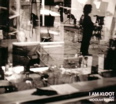
I Am Kloot: Play Moolah Rouge (Phantom)
Strange fruit is I Am Kloot. A heady mixture of hurt and defiance, self-loathing and self-belief, tenderness, compassion and snarling rage, this maverick combo has just released Play Moolah Rouge, a tour-only, ten-song collection, as various as the previously listed traits.
Recorded over three days of intense sessions, it shows what can be done with quality songs, accomplished musicianship, and a distinct absence of prissiness. The recordings are vibrant and unhurried on this rewarding album, languid yet full-bodied, a poke in the eye to the freeze-dried, post-Warholian fame of American Idol.
The proceedings kick into life with the churningly intense "One Man Brawl," a song whose title sums up the personal chaos it encapsulates. John Bramwell's voice has developed an androgynous yelp that wears elements of Patti Smith at her most agonized. It has a developing intensity that grabs one's attention, and is a worrying welcome to the bittersweet world of Kloot, where pain is cherished as a means of understanding.
"Ferris Wheel" has all the pure joy of fairground distractions and the alluring electricity of love. One of those songs with an in-built breeze coming out of the speakers, it sums up the need for the company of someone and the reward it provides when found.
"I don't know who I am
I don't know who you are,
But when I touch your hand
I see shooting stars"
"Hey Little Bird" is the album's small gem, a pure piece of unabashed folk; you can imagine Burl Ives singing this part lament, part lullaby. It is exquisitely rendered via minimalist piano from Colin McLeod and gentle affecting guitar. Timeless and touching, once it enters your head it inhabits your soul.
Bramwell comes from a select line of English songwriters such as Roy Harper and Ray Davies who can render their personal worlds in a way that becomes inclusive of listeners. His woes become theirs. He speaks to them because he is speaking for them, a conduit for things best left unsaid, but once aired the relief is tangible. You only have to witness his words being mouthed by the lips of others at one of his gigs to realize just how directly he hits the hurting heart.
Play Moolah Rouge is a heavier album in texture and tone than its three predecessors. There's an intensity and darkness here, best illustrated in "Down at the Front," a languid piece of whimsical, wistful longing. "Someone Like You" kicks ass like it should, a joyous piece of melancholy skiffle; almost throwaway, it swaggers and sways like the perfect piece of pop it so surely is. The Who on glitter pills that aren't quite working.
"Suddenly Strange" becomes a shambling epic that best illustrates the powerhouse of bass and drums (Pete Jobson and Andy Hargreaves) that pushes Bramwell's agonized, lupine howl to the limit. Almost proggy blues, it slinks and stumbles like a drunkard's punch.
Hargreaves is an endlessly inventive drummer who never misses an imaginative beat, and Jobson's elastic bass lines slink around like liquid glue, holding the proceedings together with deceptively casual ease.
A song for the end of the evening, but one track from the end of the album, "Only Role in Town" is a cry-in-your-gin, maudlin masterpiece that ought to fall to pieces. It doesn't. Think of Tom Waits at the end of an English evening when he is almost beyond caring. "At the Sea" is a simply touching parting piece.
"One day where the shoreline breaks
We'll write in sand all our mistakes
For the sea to wash away
And you will sit with me
At the sea."
This album is a perfect mission statement that blows valves on any radio head. Lyrically adept, it paints a blue, blue picture, deliciously underscored with inventive washes of pedal steel. Miss this band live at your peril. The stunning, as yet unreleased Even the Stars Die stays long in the mind, and will surely raise their profile when it eventually surfaces.
Bramwell and Co. deserve the success which critical acclaim at present falls short of providing, and after four albums they aren't going away. Genuine articles in a world of tawdry fakes, they are supremely accomplished without ever sounding pedantic.
